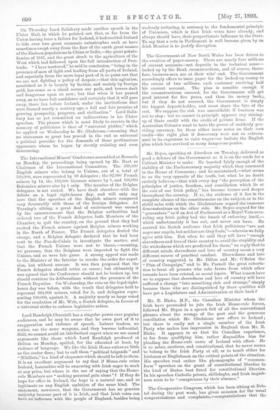Mr. Bryce, speaking at Aberdeen on Tuesday, delivered aa good
a defence of the Government as it is on the cards for a Cabinet Minister to make. He boasted fairly enough of the stability of the Parliamentary majority which they command in the House of Commons ; and be maintained,—what seems to us the very opposite of the truth, but what he no doubt entirely believes,—that with every day "the perception of the principles of justice, freedom, and conciliation which lie at the root of our Irish policy," has become keener and deeper throughout the country. If so, the evidence of it lies in the complete silence of the constituencies on the subject, or in the stolid calm with which the Gladstonians regard the immense demonstrations on the other side. Mr. Bryce argued for the " guarantees " as if an Act of Parliament or a Royal Veto over- ruling any Irish policy bad the knack of enforcing itself,— which unfortunately it has not, and never can have. He assured his Scotch audience that Irish politicians "are not sages nor angels, but neither are they fools,"—wherein we fully agree with him. But when he said they will have "enough shrewdness and love of their country to avoid the stupidity and the wickedness which are predicted for them," we reply that tc. different minds shrewdness and love of country mean a very different course of practical conduct. Shrewdness and love of country suggested to Mr. Dillon and Mr. O'Brien the "Plan of Campaign," and to Mr. Parnell the great exhorta- tion to treat all persons who take farms from which other tenants have been evicted, as moral lepers. What reason have we to suppose that shrewdness and love of country will have suffered a change "into something rich and strange," simply because those who are distinguished by these qualities will have got a Legislature and Administration at their back P


































 Previous page
Previous page